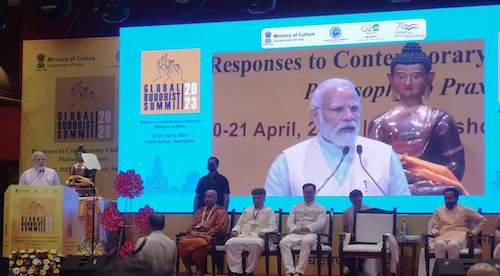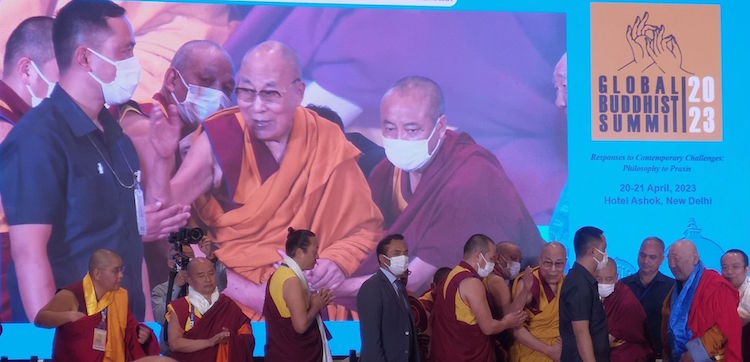By Lim Kooi Fong
This article is the 52nd in a series of joint productions of Lotus News Features and IDN-InDepthNews, the flagship agency of the Non-profit International Press Syndicate. Click here for previous reports.
NEW DELHI, 23 April 2023 (IDN | Buddhist Channel | Buddhistdoor) — A major Buddhist gathering in the Indian capital held on 20 and 21 April designed to emphasise human solidarity and global peace was helmed with major speeches by the Indian Prime Minister Narendra Modi and Tibetan Buddhist spiritual leader His Holiness the Dalai Lama.
The two-day Global Buddhist Summit organised by the Delhi-based International Buddhist Confederation (IBC) was themed “Responses to Contemporary Challenges: Philosophy to Praxis.” Attended by over 500 delegates from India and overseas, it had panel discussions and workshops that explored how the Buddha Dhamma’s (teaching’s) fundamental values can provide inspiration and guidance in contemporary settings.
When he walked into the hall, PM Modi—a Hindu—paid homage to the Buddha by offering flowers to a statue of Gautama Buddha before taking his seat alongside IBC Secretary General Venerable Dr Dhammapiya, Union Minister for Culture Kishan Reddy and Union Minister for Law and Justice Kiren Rijiju.

< Indian Prime Minister Narendra Modi addressing the Global Buddhist Summit in New Delhi. Credit: Lim Kooi Fong
In a keynote speech which was delivered off the cuff, Modi showed his dedication and keenness in sharing India’s ongoing efforts towards preserving Buddhist heritage sites in the country and establishing centres of Buddhist learning and research. He also emphasized the importance of promoting values such as compassion, non-violence, and peaceful co-existence, which are at the core of Buddhism, to address global challenges and create a better world for future generations.
He said, “The noble teachings of Gautam(a) Buddha have impacted countless people over centuries”, and inspired by these teachings “India is taking new initiatives for global welfare”.
The Prime Minister credited the teachings of the Buddha for the inherent empathy in India with regard to humanitarian issues. He mentioned peace missions and India’s whole-hearted efforts in rescue work for disasters like the recent earthquake in Türkiye. Platforms like IBC, he continued, are giving the opportunity to like-minded and like-hearted countries to spread Buddha Dhamma and peace.
The government has lavishly funded the IBC and sees this event as an excellent opportunity to develop its “soft power” by embracing the positive values of Buddhism. With its image as a rising world superpower, India also has the advantage of being the land of the Buddha. These are advantages which other prominent Buddhist countries such as Thailand and Sri Lanka do not have.
About 170 International Delegates from more than 30 different countries of the world participated in the Global Buddhist Summit. But there were no delegates from China, which claims to have the world’s biggest Buddhist population numbering over 200 million.
On the second day of the Summit, the Dalai Lama was an honoured guest who gave a keynote address. Earlier on the first day, the conference was told that his presence was uncertain because of ill health. But he did turn up with Ven Dr Dhammapiya extending a warm welcome to His Holiness.
Before introducing the Dalai Lama, Ven Dr Dhammapiya highlighted the previous day’s discussions, which covered various Buddhist traditions that have evolved worldwide, comparing these traditions to different coloured flowers that grow from the same stalk. He said that this is the teaching of Buddha Shakyamuni, pointing out that the Buddha gave different teachings to different people based on their capacity and location.
In a half-an-hour address at the summit, the Dalai Lama focused on the concepts of compassion, wisdom, and dependent origination as espoused by the Buddha. “One thing that defines the Buddha’s teaching,” he declared, “is his explanation of dependent arising. This gives us an insight into reality. Everything is dependent. Nothing is independent. Things arise in dependence on other factors. Since nothing is independent, everything comes about through dependent relationships”.
“Why is understanding dependent arising important?” asked the Dalai Lama, and then answered the question himself. “(It is) because when we don’t have this insight, we grasp at self as something substantial and real. This, in turn, can lead to our drawing distinctions between ‘us’ and ‘them’ that feed conflict. We develop an attachment to those like us and aversion to others who we see as different”.
He emphasised that compassion is at the heart of the Buddha’s teaching. “The heart of the Buddha’s teaching is a combination of compassion and wisdom, and as Buddhists, our task is to cultivate these two qualities”, he advised, adding, “Many of the problems we face are to do with how we view reality. As Buddhists we need to pay attention to the process by which we grasp at the reality of things”.
“Rituals are not important,” he continued. “What we need is the cultivation of resting and analytical meditation, an understanding of reality and the practice of compassion”. He pointed out that compassion enables one to transform adversity into opportunity, and it is important that study and investigation drive human endeavour and not dependence on blind faith.
Venerable Dr Ashin Nyanissara speaking virtually from Myanmar, also emphasized the significance of nurturing a benevolent heart that embodies qualities of love, compassion, and forgiveness. He observed that if people lack inner peace, it will be impossible to achieve peace in the world. He recommended the cultivation of insight meditation as a path towards world peace.
Prof Robert Thurman, a former student of the Dalai Lama, representing the academic study of Buddhism, recalled Modi’s statement during the summit that India has a history of commitment to ‘ahimsa’, or non-violence. This concept is vital in understanding why individuals may choose to die instead of taking life.
The approach to education developed by great Indian universities such as Nalanda allowed individuals to understand the nature of reality and how to transform the mind. The core curriculum of Nalanda has been preserved in monasteries such as Ganden, Drepung, and Sera, which have been re-established in South India, he pointed out.
Thurman stressed the importance of Buddhists engaging in discussion with scientists. He argued that the common scientific and materialistic view that we become nothing when we die is ethically problematic. If we become nothing at death, then it becomes easy to believe that we will not have to face the consequences of our actions. Instead, we must find ways to care for everyone, Thurman concluded.
In concluding comments, Dr Dhammapiya suggested that all Buddhist communities need to come forward and address the challenges faced by the world today. He highlighted that, as human beings, we are more similar than different from each other, sharing the same air and water. Hence, he encouraged a global perspective to promote world peace, protect the environment, and practice compassion. He emphasized the need to implement universal values implicit in all religious traditions to benefit everyone.
A declaration was adopted at the end of the summit on April 21, which sought focus on the need to address the burning challenges both within and globally and offer a sustainable model for the future of the world. It also focused on the need for environmental sustainability, the need to free the human race from conflict, peace, preservation and access to Buddhist pilgrimage sites.
“Let’s join hands,” Dr Dhammapiya said, “to work in harmonious unity to promote the Buddha’s teachings for the welfare and happiness of all sentient beings”. [IDN-InDepthNews]
Photo: His Holiness Dalai Lama being greeted by dignitaries attending the Global Buddhist Summit upon his arrival. Credit: Lim Kooi Fong
Visit us on Facebook and Twitter.
IDN is the flagship agency of the Non-profit International Press Syndicate.
We believe in the free flow of information. Republish our articles for free, online or in print, under Creative Commons Attribution 4.0 International, except for republished articles with permission.

